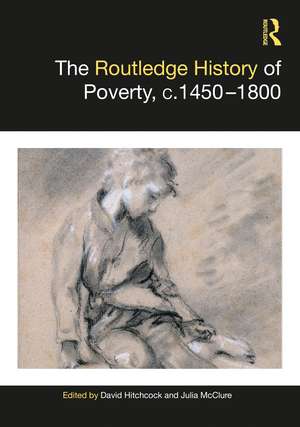The Routledge History of Poverty, c.1450–1800: Routledge Histories
Editat de David Hitchcock, Julia McClureen Limba Engleză Hardback – 31 dec 2020
The essays chart critical new directions in poverty scholarship and connect poverty to the environment, debt and downward social mobility, material culture, empires, informal economies, disability, veterancy, and more. The volume contributes to the understanding of societal transformations across the early modern period, and places poverty and the poor at the centre of these transformations. It also argues for a wider definition of poverty in history which accounts for much more than economic and social circumstance and provides both analytically critical overviews and detailed case studies.
By exploring poverty and the poor across early modern Europe, this study is essential reading for students and researchers of early modern society, economic history, state formation and empire, cultural representation, and mobility.
| Toate formatele și edițiile | Preț | Express |
|---|---|---|
| Paperback (1) | 424.71 lei 6-8 săpt. | |
| Taylor & Francis – aug 2022 | 424.71 lei 6-8 săpt. | |
| Hardback (1) | 1216.25 lei 6-8 săpt. | |
| Taylor & Francis – 31 dec 2020 | 1216.25 lei 6-8 săpt. |
Din seria Routledge Histories
-
 Preț: 350.19 lei
Preț: 350.19 lei -
 Preț: 366.82 lei
Preț: 366.82 lei -
 Preț: 349.09 lei
Preț: 349.09 lei -
 Preț: 360.94 lei
Preț: 360.94 lei -
 Preț: 347.07 lei
Preț: 347.07 lei -
 Preț: 351.63 lei
Preț: 351.63 lei - 18%
 Preț: 1612.01 lei
Preț: 1612.01 lei -
 Preț: 346.54 lei
Preț: 346.54 lei -
 Preț: 343.48 lei
Preț: 343.48 lei -
 Preț: 449.15 lei
Preț: 449.15 lei -
 Preț: 426.45 lei
Preț: 426.45 lei - 12%
 Preț: 325.34 lei
Preț: 325.34 lei - 12%
 Preț: 343.55 lei
Preț: 343.55 lei -
 Preț: 458.67 lei
Preț: 458.67 lei - 25%
 Preț: 1310.01 lei
Preț: 1310.01 lei - 11%
 Preț: 309.28 lei
Preț: 309.28 lei - 18%
 Preț: 1561.26 lei
Preț: 1561.26 lei -
 Preț: 434.54 lei
Preț: 434.54 lei -
 Preț: 501.41 lei
Preț: 501.41 lei - 12%
 Preț: 312.43 lei
Preț: 312.43 lei - 9%
 Preț: 1490.32 lei
Preț: 1490.32 lei - 18%
 Preț: 1393.29 lei
Preț: 1393.29 lei - 11%
 Preț: 307.67 lei
Preț: 307.67 lei - 25%
 Preț: 1198.05 lei
Preț: 1198.05 lei - 12%
 Preț: 318.12 lei
Preț: 318.12 lei - 26%
 Preț: 1218.32 lei
Preț: 1218.32 lei -
 Preț: 509.50 lei
Preț: 509.50 lei - 17%
 Preț: 296.80 lei
Preț: 296.80 lei - 26%
 Preț: 1244.31 lei
Preț: 1244.31 lei -
 Preț: 436.14 lei
Preț: 436.14 lei -
 Preț: 448.33 lei
Preț: 448.33 lei - 26%
 Preț: 1100.24 lei
Preț: 1100.24 lei - 32%
 Preț: 1287.32 lei
Preț: 1287.32 lei - 26%
 Preț: 1217.15 lei
Preț: 1217.15 lei
Preț: 1216.25 lei
Preț vechi: 1836.75 lei
-34% Nou
Puncte Express: 1824
Preț estimativ în valută:
232.76€ • 240.45$ • 193.71£
232.76€ • 240.45$ • 193.71£
Carte tipărită la comandă
Livrare economică 25 martie-08 aprilie
Preluare comenzi: 021 569.72.76
Specificații
ISBN-13: 9781138555006
ISBN-10: 1138555002
Pagini: 408
Ilustrații: 37
Dimensiuni: 174 x 246 mm
Greutate: 0.48 kg
Ediția:1
Editura: Taylor & Francis
Colecția Routledge
Seria Routledge Histories
Locul publicării:Oxford, United Kingdom
ISBN-10: 1138555002
Pagini: 408
Ilustrații: 37
Dimensiuni: 174 x 246 mm
Greutate: 0.48 kg
Ediția:1
Editura: Taylor & Francis
Colecția Routledge
Seria Routledge Histories
Locul publicării:Oxford, United Kingdom
Public țintă
Postgraduate and UndergraduateCuprins
Part I: Structures 1. The regulation of charity and the rise of the state 2. The economic history of poverty, 1450–1800 3. Poverty and empire 4. The vagrant poor 5. Poverty and environment in early modern England Part II: Impacts 6. Losing wealth: debt and downward mobility in eighteenth-century England 7. Poor bodies and disease 8. Motives of control/motifs of creativity: the visual imagery of poverty in early modern Europe 9. The worthiest to be relieved: disabled veterans in England, c. 1580–1630 10. Consumption and material culture of poverty in early-modern Europe, c1450–1800 Part III: Institutions 11. Institutional care for the sick and aged poor in later medieval England 12. Poverty and the workhouse 13. Relief for the body, comfort for the soul: the case of Portuguese Misericórdias 14. Architecture in relief: hospitals for the poor in Venice and Lisbon Part IV: Connections 15. Peddling and the makeshift economy 16. Poverty, law and labour in the Ottoman Empire 17. Spas for the sick poor in the early modern British Atlantic world 18. Barefoot children in a ‘fine room’: Robert Owen, Adam Smith, and social regeneration in Scotland
Notă biografică
David Hitchcock is a Senior Lecturer in Early Modern History at Canterbury Christ Church University. His research focuses on poverty and vagrancy in Britain and the Atlantic world. He is the author of Vagrancy in English Culture and Society, 1650–1750 (2016), and is working on a new book-length history of British welfare colonialism.
Julia McClure is a Lecturer in Late Medieval and Early Modern Global History at the University of Glasgow. Her research explores the global history of poverty and charity, with a particular focus on the Spanish Empire. She is the author of The Franciscan Invention of the New World (2016), and is working on a new monograph on the moral economy of poverty and the making of the Spanish Empire.
Julia McClure is a Lecturer in Late Medieval and Early Modern Global History at the University of Glasgow. Her research explores the global history of poverty and charity, with a particular focus on the Spanish Empire. She is the author of The Franciscan Invention of the New World (2016), and is working on a new monograph on the moral economy of poverty and the making of the Spanish Empire.
Descriere
The Routledge History of Poverty, c.1450-1800 is a pioneering exploration of both the lives of the very poorest during the early modern period, and of the vast edifices of compassion and coercion erected around them by individuals, institutions, and states.
